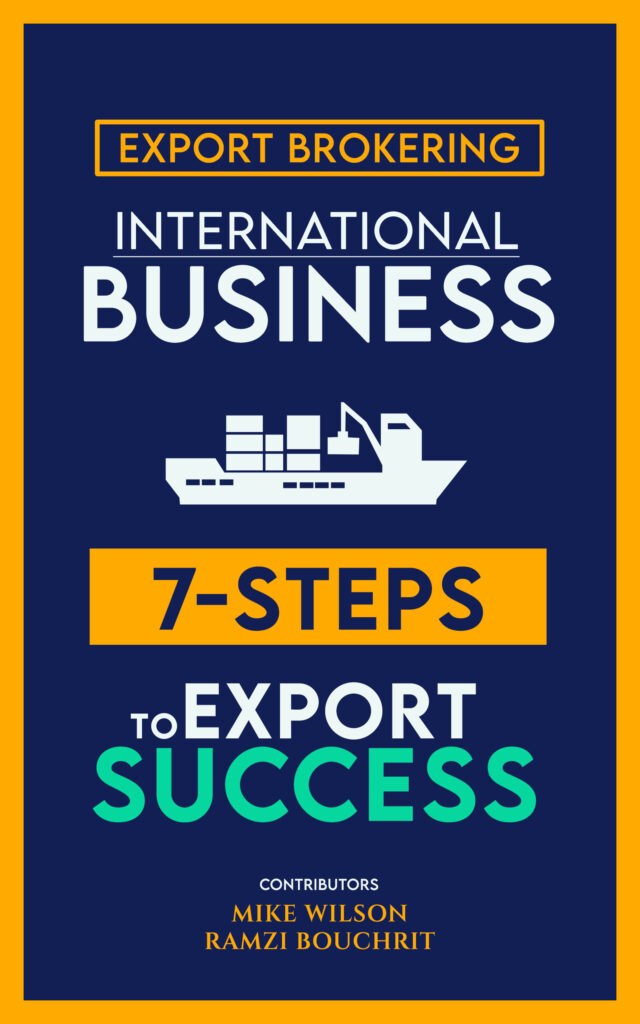Optimizing supply chain efficiency is crucial for international trade brokers seeking to excel in the competitive global marketplace. A well-structured and efficient supply chain enhances operational performance, reduces costs, minimizes risks, and improves customer satisfaction. In this comprehensive guide, we will explore the importance of supply chain efficiency in international trade brokerage, discuss strategies for streamlining procurement and sourcing, highlight methods to enhance logistics and transportation, emphasize the role of technology and automation, and underscore the significance of collaboration and communication.
In this step of “The Export Series” we will show you how to become a successful Import Export (International Trade) broker.

Mr. Ramzi Bouchrit (RB JV Group) has provided us with helpful information based on the different transactions he made with his business partners in the field of the International Trade aka import export. “The Export Series”.
H1: The Importance of Supply Chain Efficiency in International Trade Brokerage
Supply chain efficiency plays a pivotal role in the success of international trade brokers due to the following reasons:
- Cost Optimization: An efficient supply chain helps reduce costs associated with procurement, transportation, inventory management, and other operational activities. By optimizing costs, trade brokers can enhance profitability and remain competitive.
- Timely Delivery: Efficient supply chain management ensures timely delivery of goods, meeting customer expectations and reducing order fulfillment time. Timely delivery improves customer satisfaction and strengthens business relationships.
- Risk Mitigation: A well-structured supply chain minimizes risks associated with delays, disruptions, and inventory management. It enables trade brokers to respond effectively to unforeseen events and maintain smooth trade operations.
- Competitive Advantage: Supply chain efficiency provides a competitive edge in the international trade brokerage industry. By delivering products faster, reducing costs, and ensuring reliable operations, brokers gain a reputation for excellence and attract more clients.
H2: Streamlining Procurement and Sourcing
Efficient procurement and sourcing processes are fundamental to supply chain optimization. Let’s explore strategies to streamline these aspects.
H3: Supplier Evaluation and Selection
Thoroughly evaluate potential suppliers based on criteria such as quality, reliability, pricing, lead times, and compliance with regulations. Establish long-term relationships with trustworthy suppliers who can consistently meet your requirements.
H3: Negotiating Favorable Terms and Conditions
Negotiate favorable terms and conditions with suppliers, including pricing, payment terms, delivery schedules, and quality control. Effective negotiation ensures mutually beneficial agreements and improves overall supply chain efficiency.
H2: Enhancing Logistics and Transportation
Efficient logistics and transportation contribute significantly to supply chain optimization. Consider the following strategies for improvement.
H3: Efficient Freight Forwarding
Collaborate with experienced freight forwarders who specialize in international trade. They can handle complex logistics, customs procedures, and documentation, ensuring smooth movement of goods across borders.
H3: Effective Inventory Management
Implement inventory management techniques such as just-in-time (JIT) inventory, demand forecasting, and safety stock optimization. These methods minimize inventory holding costs while ensuring sufficient stock availability.
H2: Embracing Technology and Automation
Utilizing technology and automation tools enhances supply chain efficiency and effectiveness. Explore the following areas
for optimization.
H3: Implementing Supply Chain Management Systems
Invest in supply chain management systems that integrate various processes, including procurement, inventory management, logistics, and order tracking. These systems provide real-time visibility, data analysis capabilities, and streamline overall supply chain operations.
H3: Utilizing Data Analytics and Predictive Modeling
Utilize data analytics and predictive modeling to gain insights into supply chain performance, demand patterns, and potential risks. Analyzing data helps identify areas for improvement, optimize decision-making, and proactively address supply chain challenges.
H2: Collaboration and Communication
Effective collaboration and communication are essential for a well-coordinated supply chain. Focus on the following aspects to foster efficient collaboration.
H3: Building Strong Partnerships
Forge strong partnerships with key stakeholders, including suppliers, freight forwarders, and distribution channels. Collaborate closely with partners, share information, and align goals to achieve seamless supply chain operations.
H3: Information Sharing and Visibility
Establish robust communication channels and information-sharing platforms to ensure visibility across the supply chain. Timely and accurate information exchange enables quick decision-making, enhances coordination, and minimizes errors.
Conclusion
Optimizing supply chain efficiency is paramount for international trade brokers to achieve operational excellence, reduce costs, mitigate risks, and deliver superior customer experiences. By streamlining procurement and sourcing, enhancing logistics and transportation, embracing technology and automation, and fostering collaboration and communication, trade brokers can unlock the full potential of their supply chains and gain a competitive advantage in the international trade brokerage industry.
FAQs
Q1: How can supply chain efficiency reduce costs for international trade brokers?
Efficient supply chain management reduces costs by optimizing procurement, inventory management, transportation, and other operational activities. This optimization minimizes wastage, improves resource utilization, and enhances overall cost-effectiveness.
Q2: What role does technology play in optimizing supply chain efficiency?
Technology enables trade brokers to automate processes, gain real-time visibility, analyze data, and improve decision-making. Supply chain management systems, data analytics, and predictive modeling contribute to better planning, coordination, and resource allocation.
Q3: How can collaboration with suppliers and partners improve supply chain efficiency?
Collaboration fosters better information sharing, synchronization of activities, and joint problem-solving. Building strong relationships with suppliers and partners ensures a smooth flow of goods, reduces lead times, and enhances overall supply chain efficiency.
Q4: What are some common risks in supply chain management, and how can they be mitigated?
Common risks include disruptions, delays, quality issues, and regulatory compliance. Mitigation strategies include diversifying suppliers, implementing contingency plans, maintaining buffer stocks, and staying updated on regulations and compliance requirements.
Q5: How does supply chain efficiency contribute to customer satisfaction?
Efficient supply chain management enables timely delivery, reduces order fulfillment time, and ensures product availability. Meeting customer expectations enhances satisfaction, fosters loyalty, and improves overall customer experiences.
 How To Info How to info
How To Info How to info